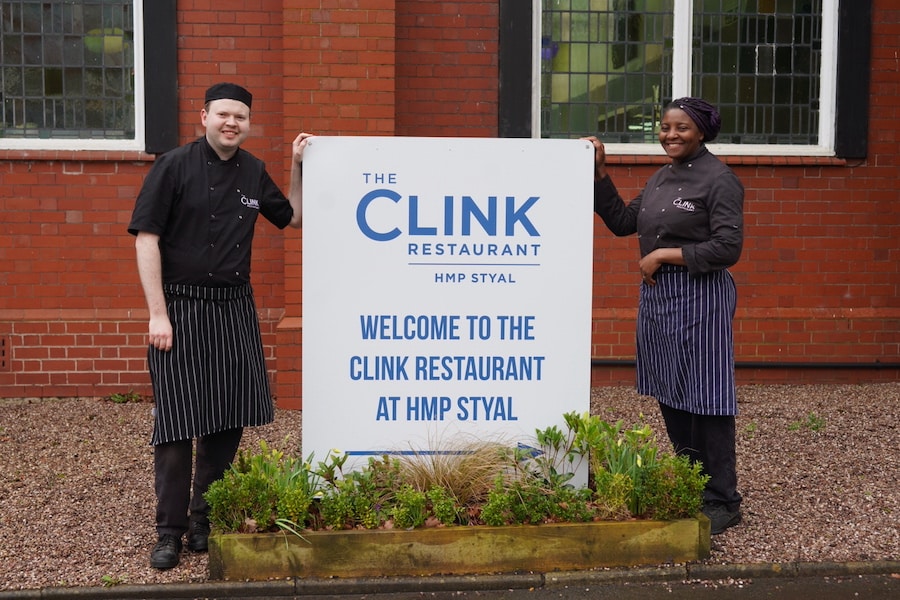What makes the perfect pie? We went to the British Pie Awards to find out
- Written by Louise Rhind-Tutt
- Last updated 4 years ago
- Food & Drink, People, Wigan
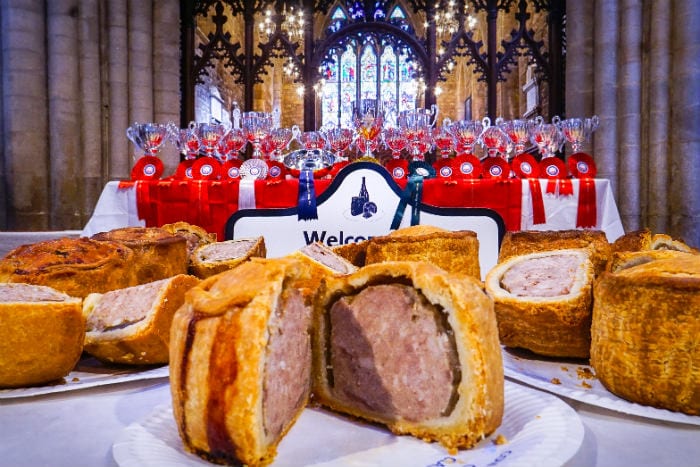
Everyone loves a pie. The average Brit eats a whopping 2,160 pies over their adult lifetime, according to a recent study – that’s 36 a year. It’s around £1 billion worth.
The survey, which tied in with British Pie Week, found that the nation’s favourite pie is the classic beef and ale, followed by apple pie, chicken and mushroom and steak and kidney. In Manchester and the north, we’re fans of the more traditional pies.
“Meat and potato pies,” said poet John Cooper Clarke, without missing a beat, when I asked him what he missed most about living in Manchester and Salford.
“You can’t get them south of Birmingham. There’s a warning for any readers who might be thinking of going south. Take your own meat and potato pies.”
We also take pies seriously. In 2015, a petition was started to make it a criminal offence to describe a casserole with a pastry lid as a pie. It gained nearly 6,000 signatures.
But what makes the perfect pie? We headed to The British Pie Awards to find out.

The awards were set up in Melton Mowbray in 2009 to honour the British pie, recognising the craft and skills of those that produce them whilst promoting British produce and regional specialities.
For the purposes of the awards, a pie is deemed to be a filling wholly encased in pastry and baked, so potato toppings such as cottage pies are not permitted. Nor are lattice tops. There are certainly no casseroles with lids here.
A total of 886 pies were entered in 23 categories from 176 producers this year – one of the highest number of producers yet.
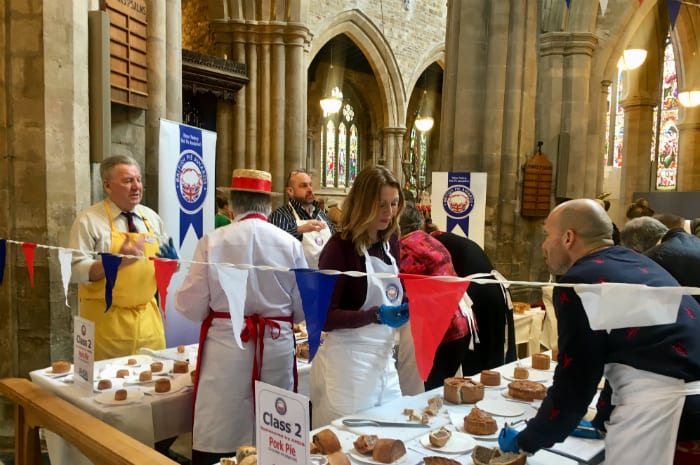
“Over the past 11 years we’ve judged over 8,000 pies, with the help of around 150 pie connoisseurs and culinary experts,” said Matthew O’Callaghan, chairman of the Melton Mowbray Pork Pie Association and host of the British Pie Awards.
Tasting pies all day sounds like a fun job – but what’s it like to be a judge at the awards? For the fourth year running, I went along to do just that.
The categories cover all sorts of pies, from pub pies to speciality game or steak and kidney – not forgetting the traditional Melton Mowbray pork pie, of course.
I was assigned the gluten-free pie category, which included 40 pies with fillings ranging from steak and Stilton to roast vegetable, and chilli beef burrito to bramley apple. Both the pastry and the filling had to be gluten-free or very low gluten.
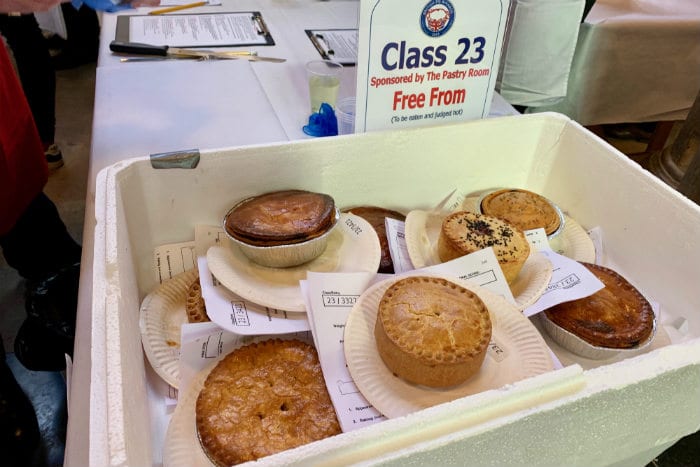
Judging is performed in pairs and is a serious business. Each pie is cut in half and examined before being tasted, and points are then deducted across six criteria:
- Appearance – including glaze or finish.
- Baking – over-baked means the pastry looks burnt, whereas under-baked can mean the dreaded soggy bottom. There shouldn’t be excessive boil out.
- Pastry thickness – including how the knife ‘feels’ as it cuts through the pie. The pastry sides and base should be of a consistent thickness, demonstrating the skill of the piemaker.
- Pastry texture and taste – it shouldn’t be too crumbly or greasy, too salty or underseasoned.
- A visual assessment of the filling – is it over- or under-filled, is there a good ratio of meat to vegetable filling, is there enough gravy or sauce?
- Filling texture and taste – is it seasoned well? Is the filling too thin or gloopy? Are any meat or vegetables overcooked or undercooked?
If judging is taken seriously, that’s partly because pies are such an important part of the country’s culinary scene – and very much so in the north.
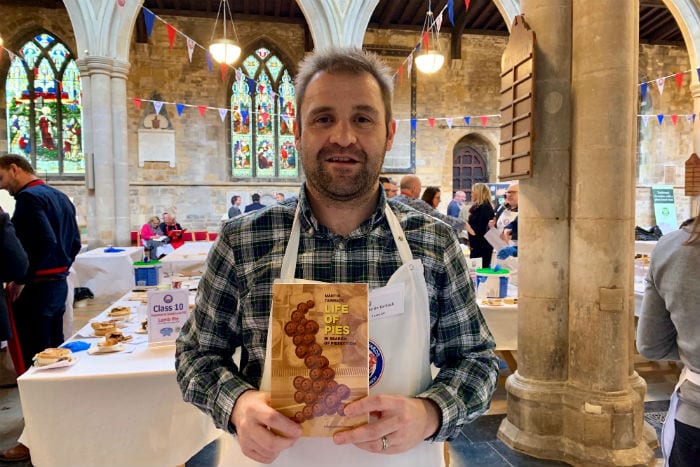
Martin Tarbuck, a fellow judge at the awards and the author of Life of Pies: In Search of Piefection, believes you can’t beat a simple northern pie.
“I grew up in Wigan, and was involved in a football fanzine,” says Martin when I asked him how his love of pies came about.
“We used to do match reports – but it became a case of it doesn’t matter what the match was like, what were the pies like? We gave the players a rating, and the pies a rating too.
“I started to compile a hit list of the pies I wanted to try, and before I knew it I was writing a book.”
Martin would get up in the early hours every weekend to travel across the country to try pies from Scotland to Cornwall.

“I ate 400 pies in two years,” he says. “314 made it into the book – which I’m sure as a pie lover you can see the relevance of the number 3.14…”
Did he try any unusual pies during his research? And what was his favourite?
“Plenty of unusual ones. Rabbit pie, horse pie, squirrel pie…” he says. “The best pie I had was in Barrow, though. On every street corner there’s a traditional pie shop. It was like recapturing my youth.
“My favourite pie is traditional meat and potato. Galloway’s meat and potato pies in Wigan are just great.”

Another fellow judge Neil Broomfield, whose Great North Pie Company has received numerous national accolades including the Supreme Champion of the British Pie Awards a couple of year back, agrees about keeping things simple.
What does he think makes the perfect pie?
“I think the pastry – butter is always best for me, and I prefer it really thin and crisp so its not too heavy,” he says.
“Fillings-wise, just keep it simple. When we started we used to play about with different fillings and try and do something different, now we’re a lot more traditional. You can’t beat the classics.”
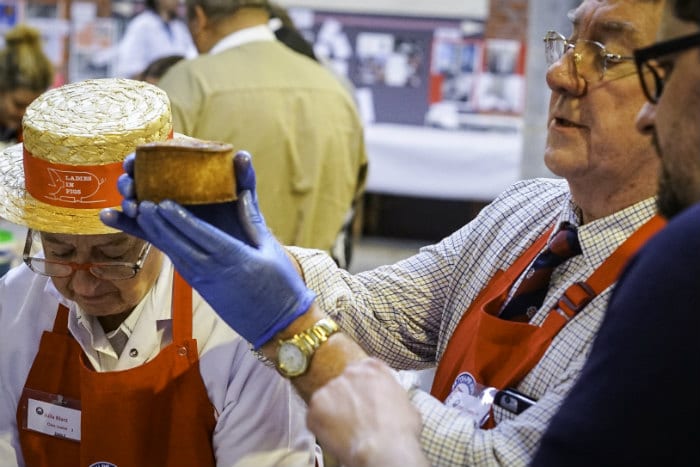
And as for the British Pie Awards, the best pies in the country will be announced on 8th March at an awards ceremony in Melton Mowbray.
Regional contenders this year include a large free range pork pie from Glossop butcher J W Mettrick & Son, a beef bourguignon pie from Lancashire’s Mill Town Pies, and two pies from Morecambe FC who have clearly perfected the humble football pie.
Or could a vegan pie or a fish and chip shop pie – new categories for this year – triumph?
All eyes are on the prize. Or in this case, the pies.
- This article was last updated 4 years ago.
- It was first published on 8 March 2019 and is subject to be updated from time to time. Please refresh or return to see the latest version.
Did we miss something? Let us know: press@ilovemanchester.com
Want to be the first to receive all the latest news stories, what’s on and events from the heart of Manchester? Sign up here.
Manchester is a successful city, but many people suffer. I Love Manchester helps raise awareness and funds to help improve the lives and prospects of people across Greater Manchester – and we can’t do it without your help. So please support us with what you can so we can continue to spread the love. Thank you in advance!
An email you’ll love. Subscribe to our newsletter to get the latest news stories delivered direct to your inbox.
Got a story worth sharing?
What’s the story? We are all ears when it comes to positive news and inspiring stories. You can send story ideas to press@ilovemanchester.com
While we can’t guarantee to publish everything, we will always consider any enquiry or idea that promotes:
- Independent new openings
- Human interest
- Not-for-profit organisations
- Community Interest Companies (CiCs) and projects
- Charities and charitable initiatives
- Affordability and offers saving people over 20%
For anything else, don’t hesitate to get in touch with us about advertorials (from £350+VAT) and advertising opportunities: advertise@ilovemanchester.com

Head down the rabbit hole for Adventures in Wonderland with Z-arts

Major rail investment set to transform Manchester-Leeds commutes

“His presence will be deeply missed” Children’s hospice bids farewell to their visionary CEO

Has Gordon Ramsay created Manchester’s ultimate bottomless brunch?

The Clink celebrates ten years of empowerment and second chances











